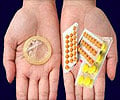Indonesia is to launch its first-ever national campaign to promote condom use to prevent unwanted pregnancies and the spread of sexually-transmitted diseases including HIV/AIDS, officials said Tuesday.
National Condom Week will coincide with World AIDS Day on December 1, said Sugiri Syarief, head of the National Family Planning Board who is overseeing the event.The groundbreaking campaign will involve condom distribution, education on the benefits of using condoms as well as following safe sex practices, and other events aimed at helping lift the stigma attached to using condoms here.
The event "is aimed at popularising condoms as a tool to prevent unwanted pregnancy and a way to prevent sexually-transmitted diseases, especially HIV" in the world's most populous Muslim nation, Syarief said.
Government efforts to promote condom use have so far focused on family planning and not generated much enthusiasm, he said, noting that condoms account for less than one percent of all contraception used in Indonesia.
An unsupportive social environment, ignorance as well as a low awareness of the importance of safe sex have conspired against condom use in the world's fourth most populous nation, he added.
The head of the Indonesian Council of Mosques, Tarmidzi Taher, said the campaign was partly aimed not at getting Muslim leaders to endorse the use of condoms but to allow them to "understand the medical arguments for them."
Nafsiah Mboi, secretary of the National AIDS Mitigation Commission, said that safe sex education would also help efforts to curb the spread of HIV.
The World Health Organisation warned in February that Indonesia had one of the fastest-growing HIV populations in Asia.
Latest official figures showed that more than 16,200 Indonesians have been infected with the HIV virus that causes AIDS since 1987, Mboi said.
"But unregistered infection cases are much more numerous, with estimates that in 2006 some 176,000 to 247,000 people have been infected by HIV" since it became prevalent, she said.
Source-AFP
ANN /J











